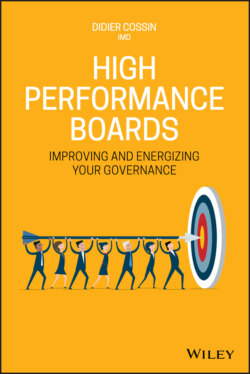Читать книгу High Performance Boards - Didier Cossin - Страница 26
Duty of Care
ОглавлениеGood judgement is essential for directors to fulfil their duty of care. When this is lacking, the quality of decision-making suffers. Judgement comes from knowledge and intuition, both of which can be improved.
First, individuals must have the necessary knowledge – acquired through education and experience – to make good, considered decisions. Education gives us the technical knowledge to understand complex problems. Curiosity helps individuals to complement their formal education and continue learning, thereby enabling access to a memory bank of information and details that may be relevant to the present.
People also use their individual experiences to draw lessons from the past and apply them to the future, in an integrative process. In some situations, either weak signals or true shocks may prompt us to realise that our knowledge is insufficient, and that we require additional input to evaluate situations effectively.
Specifically, a board member develops an integrative view – in terms of the executive world, he or she may generally put a premium on analysis, when in fact it is synthesis that is badly needed in many contexts. Because a board needs to address many stakeholders toward the long term and the next generation, a certain skill in deriving the essential from many pieces of information is key to board quality.
Intuition is the second key driver of good judgement and depends on individual personality and values. According to the Swiss psychologist Carl Jung, personality consists of both the ego – how we identify ourselves – and the unconscious or shadow side that we are not aware of and have suppressed early in life.
Emotions play an important role in intuition. They affect how we respond to crises, for example – whether we remain calm and hopeful, or suffer anxiety and panic. The other component of intuition is values. These are drawn from our sense of ethics – the moral principles that govern our behaviour – as well as individual integrity. Good judgement is a function of the interplay between internal variables and external factors, summarised in Figure 3.2.
For experienced and well-prepared board members, good judgement often materialises as a well-informed ‘gut feeling’, or right intuition. This in turn comes from lengthy preparation, going through the right materials, having the right balance, not putting too much ego into the discussions and decisions, being aware of one's weaknesses, and having both the right ethical values and the integrity to withstand pressure. All this feeds into discussions among peers in a confidential and protected setting that result in a collective board decision.
Figure 3.2 The Roots of Good Judgement: Mapping One's Strengths and Weaknesses
Good judgement is especially important today, as boards face increasing external pressures and may have to deal with crises that challenge their decision-making skills. We will discuss crisis management in more detail in Chapter 12.
